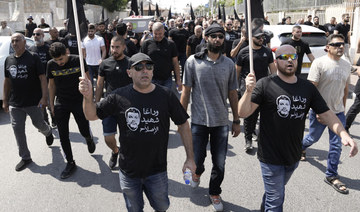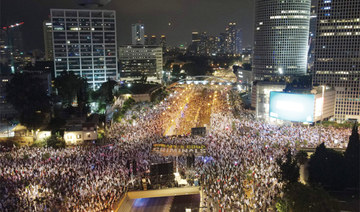JERUSALEM: “Death to Arabs!” chanted the angry mob as they encircled the university dormitories of Arab students in central Israel and tried to break down the doors.
“I am still shocked and afraid,” said one of the dozens of terrified Arab Israelis who barricaded themselves inside the Netanya Academic College dorm late last month, speaking to AFP on condition of anonymity.
As the Israel-Hamas war enters its second month, Arab Israelis — roughly 20 percent of Israel’s population — say they have been living in fear because of increasing hate crimes and attacks against them since October 7.
On that day, Hamas launched an unprecedented attack on Israel that killed more than 1,400 people, mostly civilians, according to Israeli authorities.
Aiming to destroy Hamas, Israel responded with a relentless bombardment and ground invasion of the Gaza Strip that has killed more than 10,500 people, also mostly civilians, according to the Hamas-run territory’s health ministry.
The student said that shortly before the dorm attack, Israeli police came to question them for allegedly throwing eggs at religious Jewish Israelis.
“We denied it and told them ‘The cameras are there. You can check them’,” the student told AFP.
“After that, a group gathered and tried to break down the door and attack us. They cursed us and demanded our expulsion.”
Police escorted the students to the roof for their protection while others stood at the door to prevent the protesters from entering, the student said.
The police told AFP the incident took place after the “circulation of an old publication inciting terrorism, being presented as new,” and that they were working to combat “false publications that sow panic among the public.”
“Instigators will be punished,” the police said.
Jafar Farah, director of the Mossawa Center which documents human rights violations against Arab Israelis, said far-right football fan club “La Familia,” which has ties to National Security Minister Itamar Ben-Gvir, organized the protest.
He blamed the university, police and Netanya municipality for failing to prevent the attack.
Miriam Feirberg, the city’s mayor, said the rioters should be prosecuted and students currently in the accommodation replaced by Israelis displaced from the south by the Hamas attack.
As well as raising tensions within Israel, the war has worsened relations between Palestinians and Israelis in the occupied West Bank and annexed east Jerusalem.
Even before the war, rights groups frequently highlighted regular discrimination faced by Arab Israelis, despite them holding Israeli citizenship.
“We left all our belongings in the dormitory,” the student said.
“As Arabs, we are afraid to return to college, and some are afraid to return to their rented accommodation.”
Nadim Al-Nashif, director of 7amleh, a non-profit group focused on social media, said they have identified “590,000 violent conversations in Hebrew on platforms like Facebook” and Telegram.
Among the posts were calls for a “second Nakba,” referring to the mass exodus of 750,000 Palestinians in 1948 during the war over the establishment of Israel, as well incitements to kill and expel Palestinians.
Nashif said his organization had reported many of the posts to the relevant platforms, leading to the removal of some.
Arab Israeli politician Ahmad Tibi said abuse was not unusual.
“There is no Arab Knesset (parliament) member who has not received threatening messages,” he said, including death threats.
“Why don’t the police take any action despite repeated complaints?“
Israeli labor union organization “Power to the Workers” said it had recorded attacks on Arab drivers, and warned of “increasing acts of violence against them.”
One bus driver was sprayed with gas by a group of passengers after they learned he was an Arab. He was injured slightly when the vehicle then hit an electricity pole, the union said.
Another driver was attacked “by passengers who realized he was Arab and shouted, ‘Terrorist... terrorist!’ They smashed his windshield.”
Dozens of right-wing Israelis demonstrated on Tuesday in the west Jerusalem neighborhood of Givat Shaul, mostly inhabited by observant Jews, against a shop that employs Arabs.
They held signs reading “Don’t support terrorists” and “This branch employs terrorists.”
Police prevented the protesters from entering the shop and eventually dispersed them, an employee said. But around 30 Arab workers did not return the next day.
“I didn’t go to work. It’s dangerous,” said an employee identifying herself only as Huda.
“We no longer take Israeli public transportation for fear of racist attacks,” she said. “The store management told us they couldn’t guarantee our safety.”
Arab Israelis live in fear amid surging violence
https://arab.news/9bz45
Arab Israelis live in fear amid surging violence
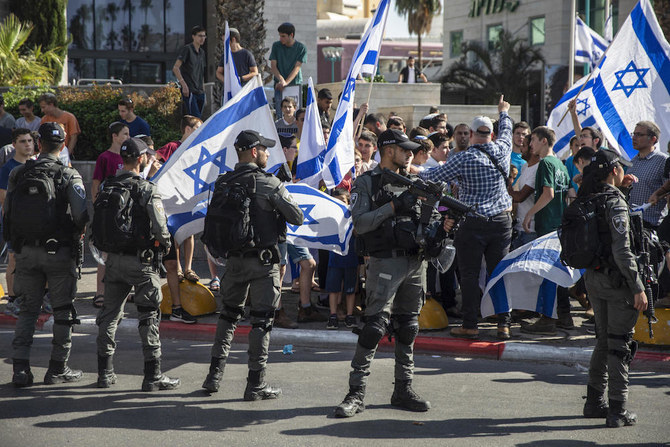
- Arab Israelis, roughly 20 percent of Israel’s population, say they have been living in fear because of increasing hate crimes
- The police told AFP the incident took place after the “circulation of an old publication inciting terrorism, being presented as new”
Oil tanker hit by missile off Yemen: security firm

- The vessel and crew are safe and continuing to its next port of call: UKMTO
- The incident occurred 76 nautical miles (140 kilometers) off Yemen’s Hodeidah
DUBAI: A crude oil tanker was hit by a missile off the coast of Yemen’s rebel-held city of Mokha overlooking the strategic Bab Al-Mandeb strait, maritime security firm Ambrey said Saturday.
“A Panama-flagged crude oil tanker was reportedly ‘attacked’” about 10 nautical miles southwest of Mokha, Ambrey said, adding that information “indicated the vessel was hit by a missile and that there was a fire in the steering gear flat.”
The British navy’s maritime security agency had earlier said it received a report of a vessel “sustaining slight damage after being struck by an unknown object.”
“The vessel and crew are safe and continuing to its next port of call,” United Kingdom Maritime Trade Operations (UKMTO) added.
It said the incident occurred 76 nautical miles (140 kilometers) off Yemen’s Hodeidah, without specifying the type of vessel involved.
The Iran-backed Houthis, who control much of Yemen, have launched dozens of attacks on vessels in and around the Red Sea since November in a campaign they say is in solidarity with Palestinians in war-torn Gaza.
The milita attacks have prompted reprisal strikes by US and British forces and the formation of an international coalition to protect the vital shipping lanes through the Gulf of Aden and the Red Sea.
Israeli forces kill senior Palestinian militant in Jenin: army

- The strike by a fighter jet and helicopter killed Islam Khamayseh
- Khamayseh was a leader of the Jenin Battalion
RAMALLAH: The Israeli military said on Saturday it killed a senior Palestinian militant during an air strike on an “operations center” in the occupied West Bank city of Jenin.
“A number of significant terrorists were inside the compound,” the Israeli Defense Forces said in a statement posted to Telegram.
It said the strike by a fighter jet and helicopter killed Islam Khamayseh, a “senior terrorist operative in the Jenin Camp” who was responsible for a series of attacks in the area.
The Al-Quds Brigade, the armed wing of militant group Palestinian Islamic Jihad, confirmed in a statement that Khamayseh was killed and several others wounded during an Israeli raid on Friday night.
It said Khamayseh was a leader of the Jenin Battalion, which is affiliated with Islamic Jihad.
The Palestinian Ministry of Health said one person was killed and eight were wounded and receiving hospital treatment as a result of Israel’s operation in Jenin on Friday night.
Israel has occupied the West Bank since 1967 and its troops routinely carry out incursions into areas such as Jenin, which are nominally under the Palestinian Authority’s security control.
The West Bank has seen a recent surge in violence, particularly since the Israel-Hamas war erupted on October 7.
More than 500 Palestinians have been killed by Israeli forces or settlers across the West Bank since October 7, according to Palestinian officials, and at least 20 Israelis have been killed over the same period, according to an AFP tally based on official Israeli figures.
The Gaza Strip has been at war since Hamas’s unprecedented attack on October 7 resulted in the deaths of more than 1,170 people in Israel, most of them civilians, according to an AFP tally based on official Israeli figures.
Israel’s retaliatory offensive on the Hamas-ruled Gaza Strip has killed at least 35,303 people, most of them civilians, according to the Hamas-run territory’s health ministry.
Fierce fighting in northern Gaza as aid starts to roll off US-built pier

- Residents say Israeli bulldozers demolishing homes, shops in Jabalia
- Hamas says US floating aid pier no substitute for end to Israeli siege
CAIRO: Israeli forces battled Hamas fighters in the narrow alleyways of Jabalia in northern Gaza on Friday in some of the fiercest engagements since they returned to the area a week ago, while in the south militants attacked tanks massing around Rafah.
Residents said Israeli armor had thrust as far as the market at the heart of Jabalia, the largest of Gaza’s eight historic refugee camps, and that bulldozers were demolishing homes and shops in the path of the advance.
“Tanks and planes are wiping out residential districts and markets, shops, restaurants, everything. It is all happening before the one-eyed world,” Ayman Rajab, a resident of western Jabalia, said via a chat app.
Israel had said its forces cleared Jabalia months earlier in the Gaza war, triggered by the deadly Hamas-led attacks on southern Israel on Oct. 7, but said last week it was returning to prevent Islamist militants re-grouping there.
In southern Gaza bordering Egypt, thick smoke rose over Rafah, where an escalating Israeli assault has sent hundreds of thousands of people fleeing from what was one of the few remaining places of refuge.
“People are terrified and they’re trying to get away,” Jens Laerke, UN humanitarian office spokesperson, said in Geneva, adding that most were following orders to move north toward the coast but that there were no safe routes or destinations.
As the fighting raged, the US military said trucks started moving aid ashore from a temporary pier, the first to reach the besieged enclave by sea in weeks.
The World Food Programme, which expects food, water, shelter and medical supplies to arrive through the floating dock, said the aid was transported to its warehouses in Deir Al Balah in central Gaza and told partners it was ready for distribution.
The United Nations earlier reiterated that truck convoys by land — disrupted this month by the assault on Rafah — were still the most efficient way of getting aid in.
“To stave off the horrors of famine, we must use the fastest and most obvious route to reach the people of Gaza – and for that, we need access by land now,” deputy UN spokesperson Farhan Haq said.
US aid was arriving in Cyprus for delivery to Gaza via the new pier, Washington said.
Hamas demanded an end to Israel’s siege and accused Washington of complicity with an Israeli policy of “starvation and blockade.”
The White House said US national security adviser Jake Sullivan would visit Israel on Sunday and stress the need for a targeted offensive against Hamas militants rather than a full-scale assault on Rafah.
A group of US medical workers left the Gaza Strip after getting stuck at the hospital where they were providing care, the White House said.
Humanitarian fears
The Israel Defense Forces said troops killed more than 60 militants in Jabalia in recent days and located a weapons warehouse in a “divisional-level offensive.”
A divisional operation would typically involve several brigades of thousands of troops each, making it one of the biggest of the war.
“The 7th Brigade’s fire control center directed dozens of airstrikes, eliminated terrorists and destroyed terrorist infrastructure,” the IDF said.
At least 35,303 Palestinians have now been killed, according to figures from the enclave’s health ministry, while aid agencies have warned repeatedly of widespread hunger and dire shortages of fuel and medical supplies.
Israel says it must capture Rafah to destroy Hamas and ensure the country’s safety. In the Hamas attack on Oct. 7, 1,200 people died in Israel and 253 were taken hostage, according to Israeli tallies. About 128 hostages are still being held in Gaza.
Israel said on Friday that its forces retrieved the bodies of three people killed at the Nova music festival in Israel on Oct. 7 and taken into Gaza.
In response, Hamas said negotiations were the only way for Israel to retrieve hostages alive: “The enemy will not get its prisoners except as lifeless corpses or through an honorable exchange deal for our people and our resistance.”
Talks on a ceasefire have been at an impasse.
‘Tragic war’
Israeli tanks and warplanes bombarded parts of Rafah on Friday, while the armed wings of Hamas and Islamic Jihad said they fired anti-tank missiles and mortars at forces massing to the east, southeast and inside the Rafah border crossing with Egypt.
UNRWA, the main UN aid agency for Palestinians, said more than 630,000 people had fled Rafah since the offensive began on May 6.
“They’re moving to areas where there is no water — we’ve got to truck it in — and people aren’t getting enough food,” Sam Rose, director of planning at UNRWA, told Reuters on Friday by telephone from Rafah, where he said it was eerily quiet.
At the International Court of Justice, or World Court, in The Hague, where South Africa has accused Israel of violating the Genocide Convention, Israeli Justice Ministry official Gilad Noam defended the operation.
The South African legal team, which set out its case for fresh emergency measures the previous day, framed the Israeli military operation as part of a genocidal plan aimed at bringing about the destruction of the Palestinian people.
Fierce fighting in northern Gaza as aid starts to roll off US-built pier

- Residents say Israeli bulldozers demolishing homes and shops in Jabalia in the path of the advance
- Hamas says US floating aid pier is no substitute for end of Israeli siege of Gaza
CAIRO: Israeli forces battled Hamas fighters in the narrow alleyways of Jabalia in northern Gaza on Friday in some of the fiercest engagements since they returned to the area a week ago, while in the south militants attacked tanks massing around Rafah.
Residents said Israeli armor had thrust as far as the market at the heart of Jabalia, the largest of Gaza’s eight historic refugee camps, and that bulldozers were demolishing homes and shops in the path of the advance.
“Tanks and planes are wiping out residential districts and markets, shops, restaurants, everything. It is all happening before the one-eyed world,” Ayman Rajab, a resident of western Jabalia, said via a chat app.
Israel had said its forces cleared Jabalia months earlier in the Gaza war, triggered by the deadly Hamas-led attacks on southern Israel on Oct. 7, but said last week it was returning to prevent Islamist militants re-grouping there.
In southern Gaza bordering Egypt, thick smoke rose over Rafah, where an escalating Israeli assault has sent hundreds of thousands of people fleeing from what was one of the few remaining places of refuge.
“People are terrified and they’re trying to get away,” Jens Laerke, UN humanitarian office spokesperson, said in Geneva, adding that most were following orders to move north toward the coast but that there were no safe routes or destinations.
As the fighting raged, the US military said trucks started moving aid ashore from a temporary pier, the first to reach the besieged enclave by sea in weeks.
The World Food Programme, which expects food, water, shelter and medical supplies to arrive through the floating dock, said the aid was transported to its warehouses in Deir Al Balah in central Gaza and told partners it was ready for distribution.
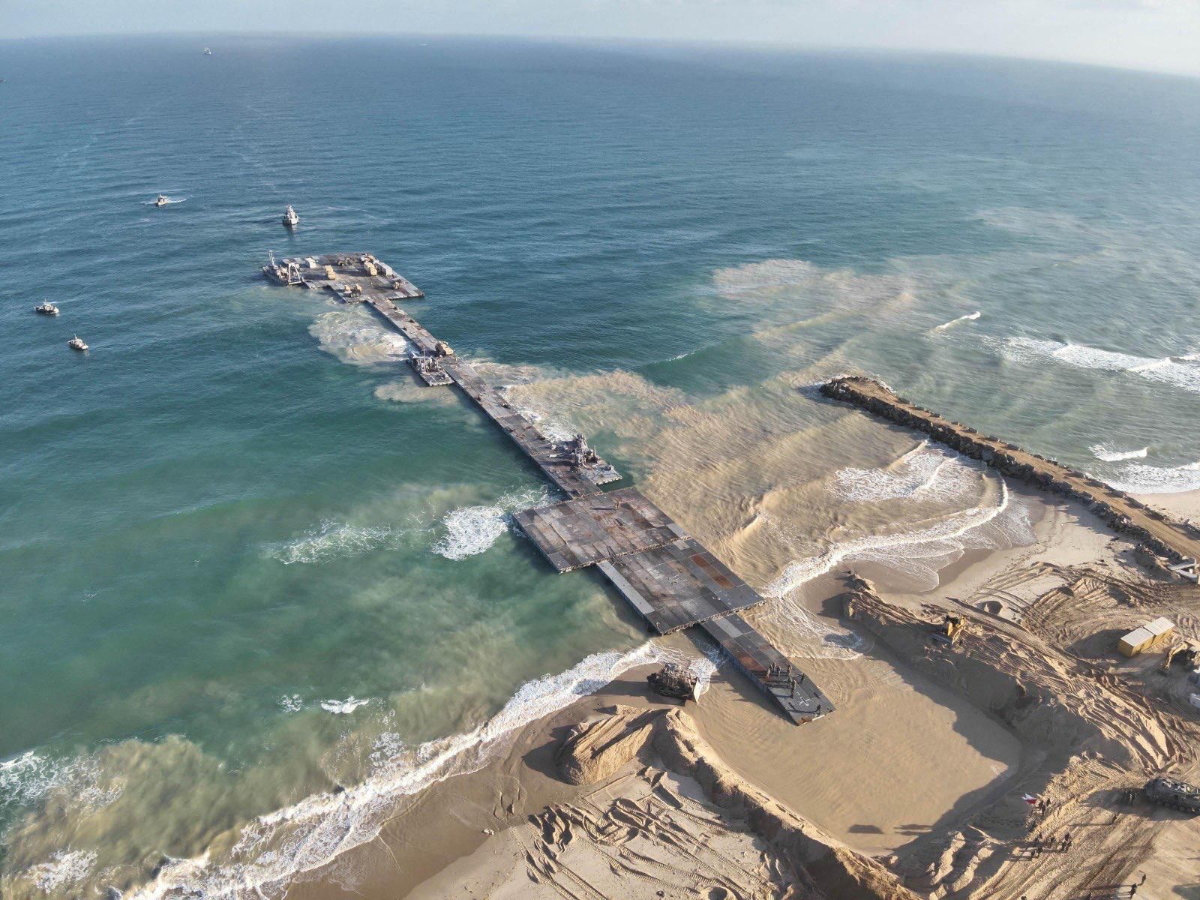
The United Nations earlier reiterated that truck convoys by land — disrupted this month by the assault on Rafah — were still the most efficient way of getting aid in.
“To stave off the horrors of famine, we must use the fastest and most obvious route to reach the people of Gaza – and for that, we need access by land now,” deputy UN spokesperson Farhan Haq said.
US aid was arriving in Cyprus for delivery to Gaza via the new pier, Washington said.
Hamas demanded an end to Israel’s siege and accused Washington of complicity with an Israeli policy of “starvation and blockade.”
The White House said US national security adviser Jake Sullivan would visit Israel on Sunday and stress the need for a targeted offensive against Hamas militants rather than a full-scale assault on Rafah.
A group of US medical workers left the Gaza Strip after getting stuck at the hospital where they were providing care, the White House said.
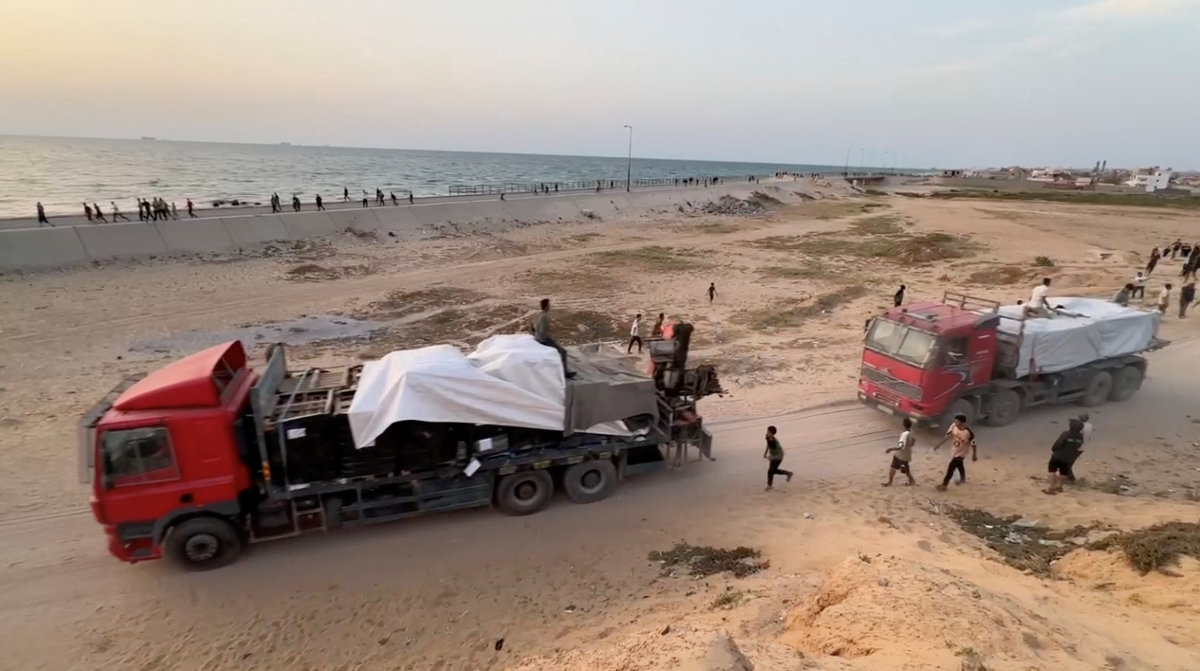
Humanitarian fears
The Israel Defense Forces said troops killed more than 60 militants in Jabalia in recent days and located a weapons warehouse in a “divisional-level offensive.”
A divisional operation would typically involve several brigades of thousands of troops each, making it one of the biggest of the war.
“The 7th Brigade’s fire control center directed dozens of airstrikes, eliminated terrorists and destroyed terrorist infrastructure,” the IDF said.
At least 35,303 Palestinians have now been killed, according to figures from the enclave’s health ministry, while aid agencies have warned repeatedly of widespread hunger and dire shortages of fuel and medical supplies.
Israel says it must capture Rafah to destroy Hamas and ensure the country’s safety. In the Hamas attack on Oct. 7, 1,200 people died in Israel and 253 were taken hostage, according to Israeli tallies. About 128 hostages are still being held in Gaza.
Israel said on Friday that its forces retrieved the bodies of three people killed at the Nova music festival in Israel on Oct. 7 and taken into Gaza.
In response, Hamas said negotiations were the only way for Israel to retrieve hostages alive: “The enemy will not get its prisoners except as lifeless corpses or through an honorable exchange deal for our people and our resistance.”
Talks on a ceasefire have been at an impasse.
’Tragic war’
Israeli tanks and warplanes bombarded parts of Rafah on Friday, while the armed wings of Hamas and Islamic Jihad said they fired anti-tank missiles and mortars at forces massing to the east, southeast and inside the Rafah border crossing with Egypt.
UNRWA, the main UN aid agency for Palestinians, said more than 630,000 people had fled Rafah since the offensive began on May 6.
“They’re moving to areas where there is no water — we’ve got to truck it in — and people aren’t getting enough food,” Sam Rose, director of planning at UNRWA, told Reuters on Friday by telephone from Rafah, where he said it was eerily quiet.
At the International Court of Justice, or World Court, in The Hague, where South Africa has accused Israel of violating the Genocide Convention, Israeli Justice Ministry official Gilad Noam defended the operation.
The South African legal team, which set out its case for fresh emergency measures the previous day, framed the Israeli military operation as part of a genocidal plan aimed at bringing about the destruction of the Palestinian people.
WHO says no medical supplies received in Gaza for 10 days

GENEVA: The World Health Organization said Friday that it has received no medical supplies in the Gaza Strip for 10 days as Israel pursues a new offensive against Hamas.
Israel’s closure of the Rafah crossing into Gaza has caused “a difficult situation,” WHO spokesman Tarik Jasarevic said. “The last medical supplies that we got in Gaza was before May 6.”
Israeli troops entered the city of Rafah on May 7 to extend their offensive against Hamas over the militant group’s attacks seven months earlier. They closed the Rafah crossing into Egypt that is crucial for humanitarian supplies.
With UN agencies warning of a growing risk of famine in Gaza, the Kerem Shalom and Erez crossings from Israel are also virtually shut down.
Jasarevic said the biggest concern was over fuel needed to keep clinics and hospitals running. Gaza’s health facilities need up to 1.8 million liters of fuel a month to keep operating.
The spokesman said only 159,000 liters had entered Rafah since the border closure. “This is clearly not sufficient,” he added, highlighting how only 13 out of 36 hospitals across the Palestinian territory were now “partially” operating.
“Hospitals still functioning are running out of fuel, and that puts so many lives at danger,” said Jasarevic. “Current military operations in Rafah are putting countless lives at risk.”
The Hamas attack on October 7 resulted in the death of more than 1,170 people in Israel, most of them civilians, according to an AFP tally based on official Israeli figures. Out of 252 people taken hostage, 128 are still held inside Gaza, but the army says 38 have died.
More than 35,300 people, mostly civilians, have been killed in the Palestinian territory since the war broke out, according to data provided by the health ministry of Hamas-run Gaza.



